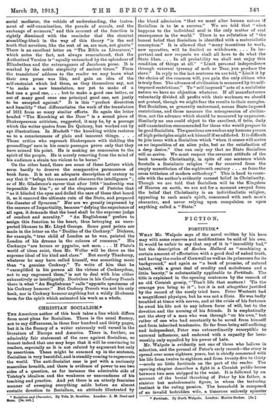CHRISTIAN SOCIALISM.* THE American author of this book takes a
line which differs from most pleas for Socialism. There is the usual fluency, not to say diffuseness, in these four hundred and thirty pages, but it is the fluency of a writer extremely well versed in the literature of Europe and America. There is, further, an admirably fair statement of the case against Socialism, so honest indeed that one may hope that it will be convincing to readers, especially as it is not refuted by argument but only by assertions. These might be summed up in the sentence, Socialism is very beautiful, and is steadily coming to regenerate the world. The anti-Socialist case is put with a curiously masculine breadth, and there is evidence of power to see two sides of a question, as for instance the admirable side of Tolstoy's idealism and the weakness or unsoundness of his teaching and practice. And yet there is an utterly feminine manner of sweeping everything aside before an almost ecstatic devotion to Socialism, an attitude illustrated by
• Socialism and Character. By 'Vida D. Scudder. London : J. N. Dent and BOMB. [55. net.i the bland admission "that we must alter human nature if Socialism is to be a success." We are told that " what happens to the individual soul is the only matter of real consequence in the world." There is no refutation of "the honest belief that Socialism is identified with a materialistic conception." It is allowed that "many incentives to work, now operative, will be limited or withdrawn. . . . In im- portant and new respects we shall all have to do what the State likes. . • . In all probability we shall not enjoy this condition of things at all." "Limit personal independence through external tyranny of mob or Tsar, you produce the slave." In reply to the last sentence we are told," Limit it by the choice of the common will, you gain the only citizen who is truly free. The advance of civilization is measured by its self- imposed restrictions." To " self-imposed " acts of a socialistic nature we have no objection whatever. If all manufacturers voluntarily divided all profits with their workmen we should not protest, though we might fear the results to their energies. But Socialism, as generally understood, means State-imposed restrictions, and these measure the retrogression of civiliza- tion, not the advance which should be measured by expansion. Similarly no one could object to the excellent, if trite, daily self-examination recommended for those who would prepare to be good Socialists. Thequestions are such as any humane person of high principles might ask himself if so addicted. It is difficult to join issue with a Socialism which "when it comes will arrive as no imposition of an alien yoke, but as the satisfaction of a deep desire." One can only say that no State Socialism will so arrive. We must respect the reverent attitude of the book towards Christianity, in spite of one sentence which foretells a Socialistic religion "as far removed from the empty monotheism of the eighteenth century . . . as from the crass tritheism of modern orthodoxy." This is hard to recon- cile with the author's evidently earnest belief in Christianity. Though we are told that Socialism will be the Kingdom of Heaven on earth, we are not for a moment swayed from the belief that Christianity is an individualistic religion, appealing to each man's spirit, concerned with each man's character, and never relying upon compulsion or upon anything called a "State."










































 Previous page
Previous page